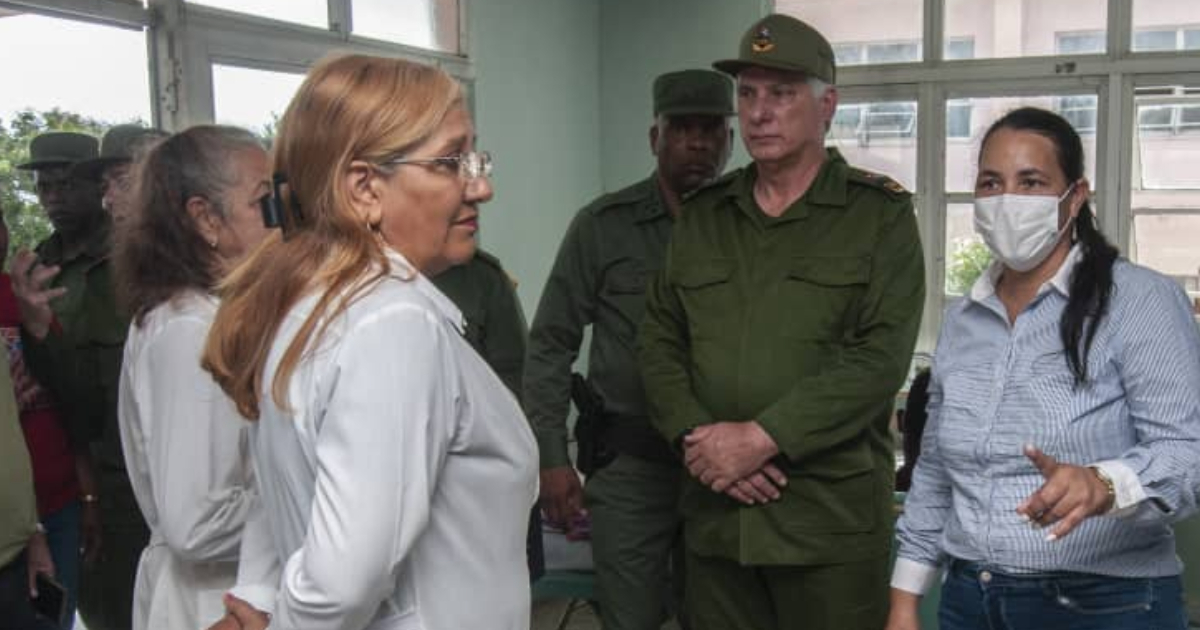President Miguel Díaz-Canel has once again pointed fingers at the United States embargo as the root cause of the "serious shortages and challenges" plaguing Cuba's healthcare system. In his view, the fact that his government allocates 14 times more funds to tourism than to healthcare and social services, or that the earnings seized from doctors sent on international missions, supposedly to bolster public healthcare, are nowhere to be seen in local hospitals, is of no consequence.
For Díaz-Canel, the blame lies elsewhere. This was evident in a post he shared on the social media platform X (formerly Twitter) on Tuesday, where he congratulated doctors on Latin American Medicine Day without a hint of self-reflection. "On Latin American Medicine Day, we express our gratitude to all healthcare workers, the pride of our nation, for their dedication to the most noble of professions in the face of the shortages and difficulties imposed by the blockade," wrote the Cuban leader.
His tweet was met with widespread criticism. "A specialist doctor's basic salary is 5,560 pesos a month (16 dollars), while a pair of shoes costs 15,000 pesos (45 dollars) in Cuba. That's just one example. Imagine having to eat, dress, and pay rent," one user retorted. Another pointed out, "Where did you get those photos, because the ones I have of public hospitals look vastly different. Show the reality."
Critics also noted the discrepancy between the healthcare available to the general public and that enjoyed by the elite. A user remarked on the fact that Díaz-Canel's granddaughters were born in a hospital reserved for high-ranking officials, devoid of shortages or difficulties. "In that hospital, there were no shortages or blockades. You even blurred the background of your photo to hide the truth about the healthcare system," commented another, amid a sea of praises likely from government supporters.
Enduring the Crisis: A Misguided Narrative
In line with Díaz-Canel's stance, the Ministry of Public Health (Minsap) issued a message of "resilience" while ignoring the reality of medical professionals leaving the field due to untenable conditions. Health Minister José Ángel Portal described the situation as "challenging times," overlooking the severe health crisis marked by outbreaks of diseases like oropouche and dengue, which experts attribute to unsanitary conditions in the streets resulting from uncollected garbage.
The rhetoric didn't stop at "shortages and difficulties" or "challenging times." Prime Minister Manuel Marrero introduced another term—"complexities"—to describe the deteriorating state of Cuba's healthcare system. This attempt to obscure reality is not new. Notable euphemisms include "Special Period" for the severe economic crisis of the 1990s and the "Task of Ordering" for the failed currency unification attempt, which led to widespread blackouts, leaving the nation in darkness for days.
Cuba's Healthcare Crisis: Key Questions and Answers
What is the main cause of Cuba's healthcare system issues according to Díaz-Canel?
Díaz-Canel attributes the problems primarily to the U.S. embargo, citing it as the main source of shortages and difficulties in the healthcare system.
How does the Cuban government prioritize spending between tourism and healthcare?
The Cuban government spends 14 times more on tourism than on healthcare and social services, according to critics of the regime.
What are some of the challenges faced by Cuban doctors?
Cuban doctors face low salaries, lack of supplies, and poor working conditions, which are exacerbated by the economic policies of the government.
